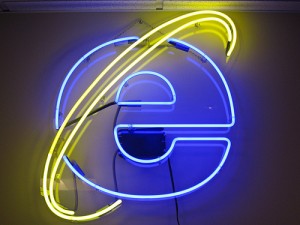

Microsoft has said that using its Internet Explorer (IE) browser will help save the environment because it uses less power. However, the difference compared with more popular browsers such as Google Chrome or Mozilla Firefox is tiny.
The Microsoft-sponsored study, carried out by Germany’s Fraunhofer Institute, found IE used less power than Chrome or Mozilla when looking at the top ten most popular websites in the US, on both laptops and personal computers. The full report, available here (PDF), also revealed the not-unsurprising news that complex Flash and HTML5 sites can increase laptop power usage by up to 50 percent.
Laptops use about 14.7 Watts when idling. Firing up a browser adds another one or two Watts to this, depending which sites are browsed, and which browser you are using, Fraunhofer found. On desktop PCs, browsers add the same amount to the energy draw – but the baseline is around 37.8W.
On average, Mozilla and Chrome used about 1W more than IE – but this means that you would have to browse for 20 hours to save the equivalent energy used to make a cup of tea, and about 1000 hours to save a whole 1kWH of energy (costing about 10p).
The fact that Microsoft is promoting this fact may say more about its concern over IE’s share, than about the energy saving ability of its browser. The graph provided in the paper cuts off the lower part of the scale, so the difference looks more significant.
The variation between websites and the technology they use seems to be far more significant, with YouTube clearly burning up to 3W more power than other popular sites such as Google. And more complex media experiences, delivered by sites using Flash or HTML5, appear to burn even more energy, with heavy HTML5 and Flash sites causing an increase in power draw of up to 8W or 9W (effectively adding 50 percent to the machine’s power draw). This means that two-and-a-half hours of constant Flash or HTML5 would burn enough energy to make a cup of tea.
Do you know all about Green IT? Take our quiz!
American space agency prepares for testing of Boeing's Starliner, to ensure it has two space…
As UK and Europe develop closer military ties, European Commission says it will invest €1.3…
Zuckerberg seeks to revive Facebook's original spirit, as Meta launches Facebook Friends tab, so users…
Notable development for Meta, after appeal against 2021 WhatsApp privacy fine is backed by advisor…
First sign of shake-up under new CEO Lip-Bu Tan? Three Intel board members confirm they…
Trump's nominee for SEC Chairman, Paul Atkins, has pledged a “rational, coherent, and principled approach”…
View Comments
This article illuminates the type of useless and wasted resources and energy expended by Microsoft, since the savings of "1 watt" of power in Browser use - no less has no real meaning or value when compared to how the company needs to significantly improve their New Windows 8 usability, and more importantly extend significantly more effort to make all their software secure and reliable, at least near to the levels produced by iOS, Android and the GNU/Linux and *BSD UNIX-likes Operating Systems.
It is inconceivable how the technology purchasing public could be so naive and simple minded to continually invest in such crap software technology just because it is popular - by contract, not necessarily by choice, and that Bill Gates is one of the world's richest billionaires and broadly admired. For what other reason other than pure wealth, I am unsure.